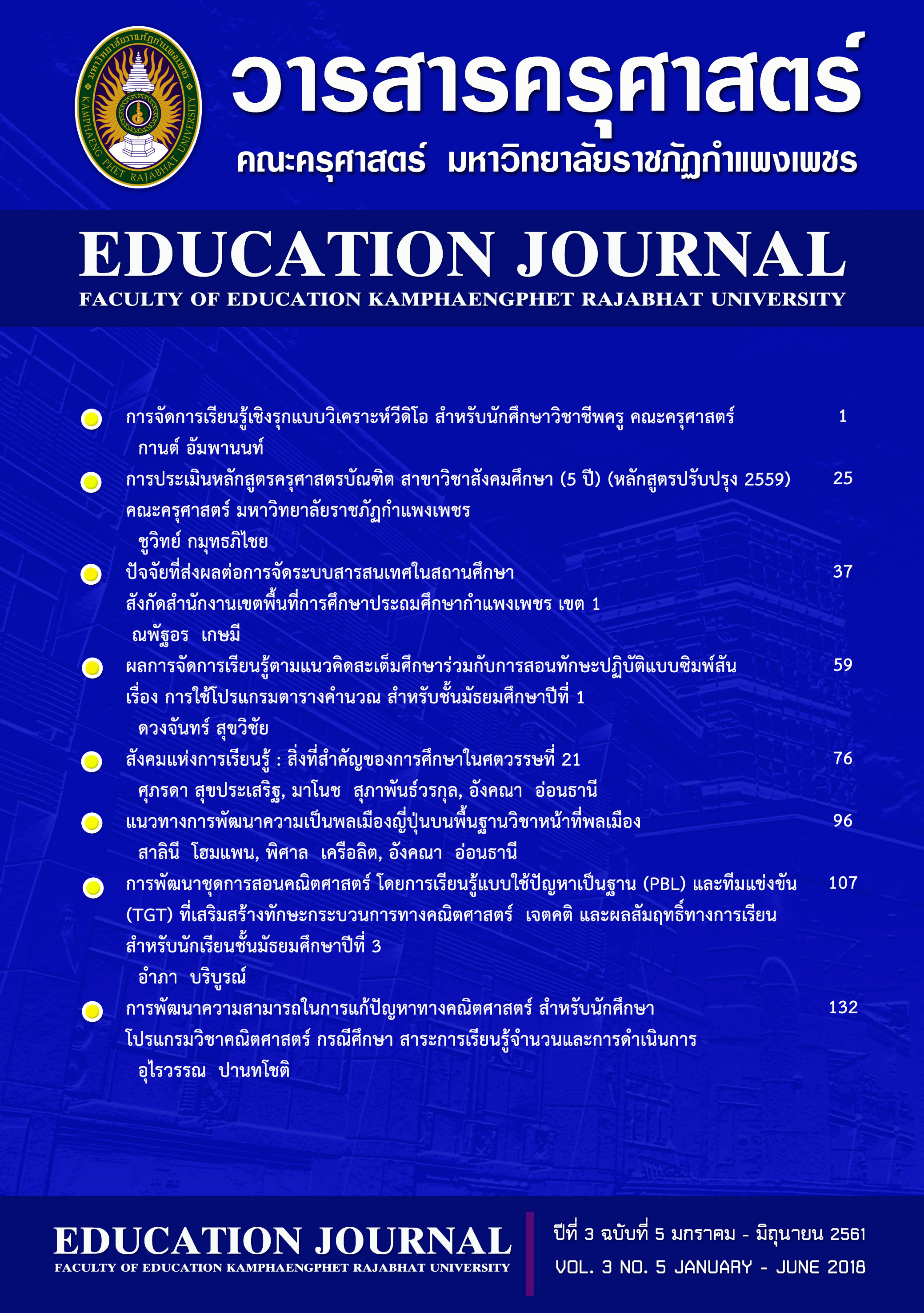THE LEARNING SOCIETY : IN EDUCATION THE 21ST CENTURY
Main Article Content
Abstract
Presently, the Thai Educational system is focused on developing its educational system as well as developing human resources to meet up with the 21st century model and its demands, enhancing learners with desired characteristics alongside with the development of competencies for job management. The creation of a learning society will enhance the quality of learners in the future due to the fact that it is an educational arrangement that everyone has undergone and has been educated from kindergarten to university and throughout life by giving the knowledge of 3R7cs, enhancing workers with expertise and professional skills and who can think creatively as well as be innovative using science, technology and other fields that are productive oriented. The role of the instructor is transformed into a facilitator while that of the learner is to gain knowledge practice, experimentation and searching for more knowledge to answer more questions. For this reason, a good educational system for the modern generation should completely change its model to follow the circle of a learning society, in this learning society coordination and collaboration with all other sectors (Co- creators), integrate the learning society into the educational system along with the design of teaching management where people in the society can actively learn under all conditions in order to have a better and quality life in the future.
Article Details

This work is licensed under a Creative Commons Attribution-NonCommercial 4.0 International License.
CC Attribution-NonCommercial-NoDerivatives 4.0
References
เลขาธิการสภาการศึกษา.สำนักงาน. (2559). การจัดอันดับขีดความสามารถในการแข่งขันด้าน การศึกษาของประเทศไทยโดยเวทีเศรษฐกิจโลก พ.ศ.2558-2559(World Economic Forum: WEF2015-2016). กรุงเทพฯ : พริกหวานกราฟฟิค จำกัด.
ไพฑูรย์ สินลารัตน์. (2554). CCPR กรอบคิดใหม่ทางการศึกษา. กรุงเทพฯ : มหาวิทยาลัยธุรกิจ บัณฑิต.
ไพฑูรย์ สินลารัตน์ .(2557). ทักษะแห่งอนาคตที่ 21 : ต้องก้าวให้พ้นกับดักของตะวันตก. กรุงเทพฯ:มหาวิทยาลัยธุรกิจบัณฑิตย์.
คณะกรรมการการศึกษาแห่งชาติ .กองบรรณาธิการ. (2554,กันยายน). ยกระดับการศึกษาด้วย เทคโนโลยีก้าวนำสู่เวทีระดับโลก. ใน วารสารวิทยาจารย์.ปีที่ 11 (110), หน้า 301).
จรัส สุวรรณเวลา, (2547). สังคมความรู้ยุคที่ 2. กรุงเทพฯ : สถาบันวิทยาศาสตร์การแพทย์ จุฬาลงกรณ์มหาวิทยาลัย.
ดวงกมล สินเพ็ง. (2551). การพัฒนาผู้เรียนสู่สังคมแห่งการเรียนรู้ : การจัดการเรียนการสอนที่เน้น ผู้เรียนเป็นศูนย์กลาง. กรุงเทพฯ : สำนักพิมพ์แห่งจุฬาลงกรณ์มหาวิทยาลัย.
ธำรง บัวศรี. (2504). ทฤษฎีหลักสูตร ภาค 2. พระนคร : มงคลการพิมพ์.
นิธิ เอียวศรีวงศ์. (2525). ปากไก่และใบเรือ : ความเรียงว่าด้วยวรรณกรรมและประวัติศาสตร์ต้น รัตนโกสินทร์. กรุงเทพฯ: อมรินทร์การพิมพ์.
พรธิดา วิเชียรปัญญา. (2547). การจัดการความรู้. กรุงเทพฯ : ธรรกมลการพิมพ์.
ราชบัณฑิตยสถาน.(2559). พจนานุกรมฉบับราชบัณฑิตยสถาน พ.ศ. 2555. (พิมพ์ครั้งที่ 2). กรุงเทพฯ:
วรพจน์ วงศ์กิจรุ่งเรือง และ อธิป จิตตฤกษ์. (2554.) ทักษะแห่งอนาคตใหม่ : การศึกษาเพื่อศตวรรษที่ 21. กรุงเทพฯ : สำนักพิมพ์ openworld.
วิจารณ์ พานิช , (2556). การสร้างการเรียนรู้สู่ศตวรรษที่ 21. มูลนิธิสยามกัมมาจล. กรุงเทพฯ : มหา นคร: ส.
วิจารย์ พานิจ. (2555) . วิถีการสร้างการเรียนรู้เพื่อศิษย์ ในศตวรรษที่ 21. กรุงเทพฯ : มูลนิธิสตศรี- สฤษดิ์วงศ์.
สมพงษ์ จิตระดับ. (2556). หลักสูตรพื้นฐานใหม่มี 6 กลุ่มสาระ. (ออนไลน์). แหล่งที่มา : http://www.kroobannok.com/57477. 23 ตุลาคม 2556.
อรุณ เบญญคุปต์ และสุดารัตน์ อาแวแตะ. (2559, พฤศจิกายน). “ศึกษาต่อยอดและขยายผลในเรียนรู้แบบเครือข่ายโดยการมีส่วนร่วมของชุมชนเพื่อสุขภาวะเด็กและเยาวชนอย่างยั่งยืน: บทเรียนจากการ ปฏิบัติ. กรุงเทพฯ: DPU Coolprint มหาวิทยาลัยธุรกิจบัณฑิตย์.
Bellanca. J. & Brandt} R.(editors) (2010). 21st Century Skills. Rethinking How Students Learn. Bloomington, IN : Solution Tree Press.
Benjamin S. Bloom, (1997). The Developing Child. 6th ed . New York : Macmillan/ McGraw– Hill.
Canton,J (2006). The Exterme Future : The top trends that will reshape the world in the next 20 years. New York : Pengiun group.
Drucker, P.F (1995). Innovation and entrepreneurship. Boston: Butterworth-Heineman.
Global Megatrends, (2012) . Our future world: Global megatrends that will change the way we live. (online) http://citeseerx.ist.psu.edu/viewdoc/download?doi=10.1.1.476.8195&rep=rep1&type=pdf.
Partnership for 21st Century Skills. (2009). P21 Framework Definitions. (online) Available from http://www.p21.org/storage/documents/P21-Framework - Definitions.pdf. ( November 18 , 2012 ).
World Economic Forum, (2014-2015): Geneva: World Economic Forum. (online) http://www3.weforum.org/docs/WEF_Global CompetitivenessReport_2014- 15.pdf.
World Health Organization. (1994). Life skills educations in schools. Geneva : WHO.


